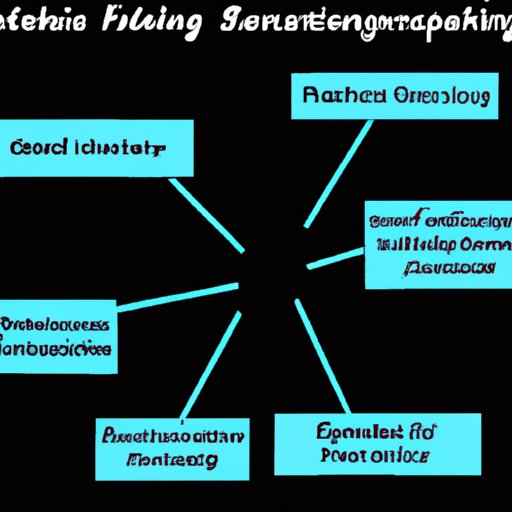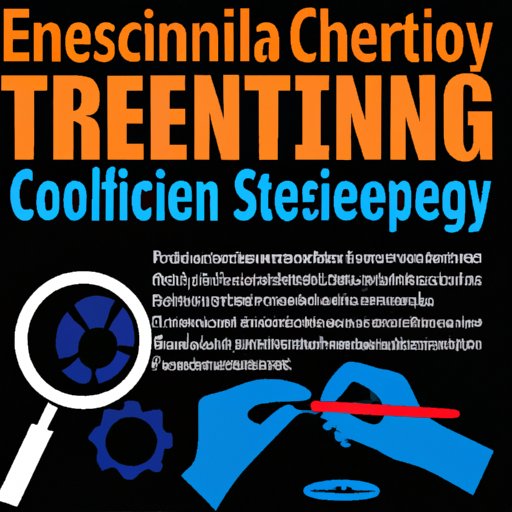Introduction
A forensic science technician is a professional who collects, preserves, and analyzes physical evidence to help solve criminal cases. They are responsible for documenting evidence, interpreting results, and preparing reports which can be used in court proceedings. This article will explore the role of a forensic science technician, including the duties and responsibilities, education, training and certification requirements, job outlook and benefits.

Overview of the Role of Forensic Science Technicians
Forensic science technicians play a vital role in the criminal justice system by gathering, preserving and analyzing evidence from crime scenes. Their findings can help law enforcement agencies determine what happened at a crime scene and identify potential suspects.
Collecting and Analyzing Evidence
Forensic science technicians are responsible for collecting, preserving and analyzing physical evidence from crime scenes. They must use specialized tools and techniques to collect, store and analyze evidence, such as fingerprints, DNA samples, fibers and bodily fluids. They may also be called upon to testify in court about their findings.
Working with Law Enforcement Agencies
Forensic science technicians often work closely with law enforcement agencies to help solve criminal cases. They may be called upon to provide expert witness testimony in court proceedings. Additionally, they may be asked to provide consultation to police officers or detectives during investigations.
Exploring the Duties and Responsibilities of Forensic Science Technicians
The duties and responsibilities of a forensic science technician vary depending on the type of evidence being examined. Generally, these professionals are responsible for the following:
Documenting Evidence
Forensic science technicians must document all evidence collected from crime scenes. This includes taking photographs, videos and detailed notes about the evidence. These documents must be accurate and complete so that they can be used as evidence in court proceedings.
Analyzing Physical Evidence
Forensic science technicians must use specialized tools and techniques to analyze physical evidence from crime scenes. This includes examining fingerprints, DNA samples, fibers and bodily fluids. They must be knowledgeable about the different types of evidence and how to analyze them properly.
Interpreting Results
Once the evidence has been collected and analyzed, the forensic science technician must interpret the results. This requires an understanding of the scientific principles involved in the analysis of the evidence. The technician must be able to explain the results in a clear and concise manner.
Preparing Reports
Forensic science technicians must prepare detailed reports about the evidence they have collected and analyzed. These reports must be thorough and accurate so that they can be used as evidence in court proceedings. The technician must be able to clearly explain the results of their analysis in the report.
Understanding the Education, Training and Certification Requirements for Forensic Science Technicians
Most employers require forensic science technicians to have a bachelor’s degree in forensic science or a related field. Additionally, many employers prefer candidates who have completed internships or other hands-on experience in the field.
Degree Programs
There are a variety of degree programs available for those interested in becoming a forensic science technician. Many colleges and universities offer degree programs in forensic science or related fields, such as criminal justice, biology or chemistry. These programs typically include coursework in topics such as criminal investigation, evidence collection, laboratory analysis and legal proceedings.
Licensing and Certifications
In some states, forensic science technicians may need to be licensed or certified in order to practice. Licensing and certification requirements vary by state, so it is important to research the specific requirements in your area. Additionally, some employers may require technicians to obtain certifications in specific areas of forensic science, such as DNA analysis or firearms examination.

Examining the Job Outlook for a Career in Forensic Science Technology
According to the U.S. Bureau of Labor Statistics, the employment of forensic science technicians is expected to grow 14 percent from 2018 to 2028. This growth is faster than average for all occupations.
Employment Numbers
The BLS estimates that there were about 20,000 forensic science technicians employed in the United States in 2018. This number is expected to increase to 22,800 by 2028.
Salary Expectations
The BLS states that the median annual wage for a forensic science technician was $58,230 in May 2019. The highest 10 percent earned more than $94,500, while the lowest 10 percent earned less than $35,680.

Investigating the Different Areas of Specialization in Forensic Science Technology
Forensic science technicians may specialize in a variety of areas, such as DNA analysis, toxicology or firearms examination. Each specialization requires its own set of skills and knowledge.
DNA Analysis
Forensic science technicians who specialize in DNA analysis must be knowledgeable about the various methods used to analyze and compare DNA samples. They must also understand the laws and regulations governing the use of DNA evidence in criminal cases.
Toxicology
Forensic science technicians who specialize in toxicology must be knowledgeable about the effects of drugs and poisons on the body. They must be able to analyze blood and tissue samples to determine the presence of toxins in the body.
Firearms Analysis
Forensic science technicians who specialize in firearms examination must be knowledgeable about the different types of firearms, ammunition and ballistics. They must be able to analyze evidence from crime scenes to determine the weapon used and the direction and distance of the shot.
Highlighting the Benefits of Becoming a Forensic Science Technician
Becoming a forensic science technician can be a rewarding career path. Here are some of the benefits of pursuing a career in this field:
Variety of Work
Forensic science technicians have the opportunity to work on a variety of cases, from homicides to environmental crimes. This allows them to stay up-to-date on the latest developments in the field and gain experience in different areas of the law.
Challenging Profession
Forensic science technicians must use their knowledge and skills to examine and analyze evidence from crime scenes. This can be a challenging and rewarding profession as each case presents new challenges to be solved.
Impact on Society
Forensic science technicians have the opportunity to make a positive impact on society. Their work can help bring criminals to justice and bring closure to victims and their families. As one forensic scientist noted, “We are the voice of the victims.” (Koley, 2019).
Conclusion
This article explored the role of a forensic science technician, including the duties and responsibilities, education, training and certification requirements, job outlook and benefits. Becoming a forensic science technician can be a rewarding career path, offering a variety of work, challenging tasks and the chance to make a positive impact on society.
Summary of the Article
This article discussed the role of a forensic science technician, including the duties and responsibilities, education, training and certification requirements, job outlook and benefits. It highlighted the variety of work, challenge and impact of becoming a forensic science technician.
Final Thoughts on the Career Path of a Forensic Science Technician
A career as a forensic science technician can be a rewarding and challenging choice. Those who pursue this career path can expect to work on a variety of cases and make a positive impact on society.
(Note: Is this article not meeting your expectations? Do you have knowledge or insights to share? Unlock new opportunities and expand your reach by joining our authors team. Click Registration to join us and share your expertise with our readers.)
